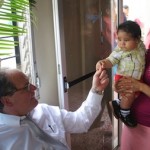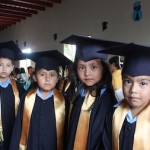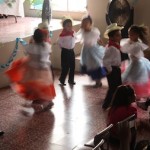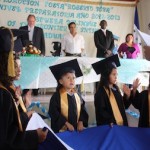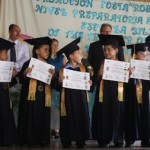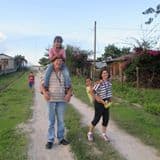
November 1, 2014
Laura and Paul Manship are pleased to begin their new position as Director of Communications and Development for Shoulder to Shoulder. They have been in Honduras since September of 2013 and have volunteered at two NGOs. They began at Montaña de Luz en Morecelí, El Paraiso. Montaña de Luz is a home for children who are infected or affected with HIV. Over the last few months they have lived in La Esperanza, Intibucá, volunteering their time and talent at Maestro en Casa, a long-distance learning program for secondary education. As of November 1, 2014, they will begin their service to Shoulder to Shoulder, living in La Concepción.
Shoulder to Shoulder is doing such incredible things in the Frontier region of Intibucá, and, for Laura and Paul, it will be a privilege and an honor to highlight and promote such important work. The ongoing, primary health and dental care, the public health work, the preventive care instruction, the brigade work, the education programs, the nutritional programs, and clean water programs are all part of an empowerment model of service that will richly enhance people´s lives. The transformative stories cry out to be told and celebrated.
Both Laura and Paul are licensed professional Social Workers in the state of Massachusetts where they lived before coming to Honduras. Their background and experience is unique and diverse. Laura is also a MBA and last worked in a Community Health Center in Holyoke, MA as Director of Operations and Behavioral Health Services. Paul was a Roman Catholic priest for seventeen years working with the Latino community of Western MA before voluntarily leaving active ministry in 2005 and marrying Laura in 2006. Since then and prior to moving to Honduras, he was a supervisor for Elder Protective Services.
Laura´s two children, Emma and Greg, have both begun their professional careers. The empty nest gave Paul and Laura the inspiration to follow their dreams, selling house and belongings and moving to Honduras. They are excited to begin working shoulder to shoulder in community to create and operate sustainable health, nutrition, and education services with equitable access for everyone.
Shoulder to Shoulder's Partnership with Salud Mesoamérica 2015
March 22, 2014
In 2012, Shoulder to Shoulder was selected by the Ministry of Health has a representative for the Mesoamérica Health Initiative. Mesoamérica Health 2015 is a 5-year, public-private partnership initiative to reduce health equity gaps in Mesoamérica faced by those living in extreme poverty. The initiative (SM2015) is funded by the Carlos Slim Foundation, the Bill and Melinda Gates Foundation, the government of Spain, and the World Development Bank.
The initiative’s goal is to support regional governments’ efforts in achieving the Millennium Development Goals in health, through investments in proven interventions for the poorest 20% of the population, mainly women and children under five. SM2015 supports meeting these goals through extending coverage, quality and use of basis reproductive health services; improving maternal, neonatal and infant health care services; improving child nutrition and increasing immunization coverage.
At the regional level, specific targets include:
• Reducing infant mortality by an average of 15% in the poorest countries of the region in the 20% poorest.
• Attend 260,000 poor children with health interventions to reduce chronic malnutrition.
• Ensure that 90% of children under two years of age of the poorest quintile have all vaccinations.
• Increase the number of births attended by skilled personnel by 50% to reduce maternal and neonatal mortality
The initiative’s guiding principles include:
1. Equity and targeting the extremely poor.
2. Country ownership and alignment with national and regional policies.
3. Impact and results-based approach.
4. Measurement and evaluation of performance.
5. Transparency and accountability.
6. Additionality (Funding granted may not replace national funding to ensure the sustainability of investments)
7. Coordination with regional bodies.
As a result of Mesoamérica, Shoulder to Shoulder has received supplies and equipment, trainings, implemented new processes to maximize the efficient use of resources, and augmented existing government programs targeted at children under 5. Shoulder to Shoulder will soon be undergoing an evaluation and if the organization, as well as the other 5 participating decentralized models achieve 80%, will proceed to the next round of funding and associated targets. Shoulder to Shoulder was chosen not only for the challenges of providing care for the population it serves but also for the competency of its staff. Stay tuned to hear how we performed for our first evaluation. For more information about the project’s work throughout Mesoamérica, please visit: www.sm2015.org.
Bilingual School Graduation
In this part of Honduras, every accomplishment is worthy of celebration. On May 18, fourteen kindergarten students received their diplomas in the first graduation ceremony for the Frontier Bilingual School of Intibucá in Camasca, Honduras. In just its first year, the bilingual school has received accolades from the local community and from national educators.
The bilingual school is the first of its kind in the rural Honduras frontier. It provides the indigenous population, many of whose families live on less than two dollars a day, with a high-quality bilingual education. The school plans to add a grade each year as the students advance.
The 100 person-strong crowd and the leaders in attendance demonstrated the significance of this initiative in the Honduras frontier region. Shoulder to Shoulder President Wayne Waite, representatives from the Honduran Ministry of Education, and the mayor of Camasca attended and spoke during the celebration. The ceremony was played on national television in the days following graduation, further emphasizing the significance of this seemingly small accomplishment.
At the ceremony, the students, faculty, and community of Camasca expressed their gratitude to Shoulder to Shoulder and the Good Shepherd Community of Cincinnati for believing in the school and for helping make their dreams a reality. Shoulder to Shoulder director of Education Profesora Iris Villanueva told the crowd: “With this initiative, we have provided a beacon of hope for children in this region and set a precedent for others to follow elsewhere in the country.”
Click the links to learn more about the bilingual school, our scholarship programs, and how you can help.


